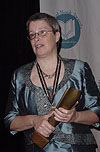National Book Awards Go to Vollman, Didion, Merwin, and Birdsall
 Fiction winner William T. Vollmann |
The 56th annual National Book Awards ceremony was held at the New York Marriott Marquis Hotel on Wednesday, November 16. Over 600 people attended the formal ceremony and dinner, which benefited the National Book Foundation, the sponsor of the awards. Two literary legends, Norman Mailer and Lawrence Ferlinghetti, were honored for their life's work, and there were some surprising, and not so surprising, winners. The most unexpected selection, which seemed to shock the author most of all, was William T. Vollmann, who won the Fiction award for Europe Central (Viking) and beat out odds-on favorite E.L. Doctorow (The March, Random House). For her memoir, The Year of Magical Thinking (Knopf), Joan Didion took home the Nonfiction award.
When he was announced as the winner, the visibly dazed Vollman confessed, "I thought I would lose, so I didn't prepare a speech." Recalling his comprehensive investigation of German atrocities during the Second World War for Europe Central, he said, "I'm so glad it's over, and I don't have to think about it anymore."
Following the ceremony, Vollman told the reporters milling around him, "It makes me happy to create something beautiful. If others think its beautiful or interesting then I'm gratified. If it subsidizes my way of life then I'm grateful, but the world doesn't owe me or any other artist a living. I do it because it makes me happy."
 Young People's Literature winner Jeanne Birdsall |
W.S. Merwin (Migration: New and Selected Poems, Copper Canyon Press) won in the Poetry category, and The Penderwicks: A Summer Tale of Four Sisters, Two Rabbits, and a Very Interesting Boy by Jeanne Birdsall (Knopf Books for Young Readers) -- a Summer 2005 Top Ten Book Sense Children's Pick -- took the prize for Young People's Literature.
This year's nonfiction category reached an NBA record of 542 entrants. Winning writer Didion, whose book was an October 2005 Book Sense Notable, kept her acceptance speech brief. "There's hardly anything I can say about this except thank you to everyone at Knopf, who accepted my idea.... Thank you. Thank you all."
Merwin, who was unable to attend, sent his stepson in his place with the message, "I wanted to say thank you, as inaccurate or incomplete as these words may be."
In her acceptance speech, Birdsall quoted from her favorite review of The Penderwicks, written by a third grader: "This book is about being a good listener... even if you're a grownup." She said, "Thank you all for being good listeners, even though you're grownups."
After the awards were over, Birdsall told BTW that she felt "fabulous." A former photographer, Birdsall said that she had decided to become a writer of children's books when she was 10-years-old. At that time she had read that Edward Eager claimed he began writing children's books because E. Nesbit was dead and could not longer write them. She recalled her childhood thought that "I would like to do the same thing for [Eager] when I get older."
In addition to the $10,000 prize, the winners received a bronze statue of a rolled sheaf of pages.
The first Literarian Award for Outstanding Service to the American Literary Community was presented to poet Lawrence Ferlinghetti, owner of San Francisco's City Lights Bookstore. He lightheartedly questioned, "What is a literarian anyway? It sounds a bit old school to me, it sounds like it's for old guys." He added, "It's for young guys of both sexes and many colors." He grew more serious warning against the "barbarians at the gate" and closed with his poem "Are There Not Still Fireflies?"
Following Ferlinghetti's speech, Toni Morrison introduced Mailer and presented him with the Medal for Distinguished Contribution to American Letters. Morrison lauded him for his "carnivorous intelligence" and said the "history of America of the 20th and 21st century would be ... inaccurate minus the inclusion of the work of Norman Mailer." She balanced this part of her "paean," as Mailer called it, by adding that he was guilty of an "almost comic obtuseness regarding women and race."
In response, Mailer, who was helped to the stage, thanked Morrison, and by and large accepted her analysis of his strengths and failings. He went on to express his anxiety for the "serious novel," which he feared "may soon be endangered." He proclaimed that the "vast majority of fiction is all too forgettable" and that the "good serious novel is inimical to the marketplace." He was not without hope, however, and said, "So here's to the future Tolstoys, the future Joyces, Prousts, and Dostoyevskies." --Karen Schechner with reporting by Nomi Schwartz

